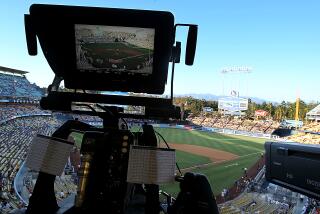Editorial: The Dodgers blackout is bad, but let’s not make a federal case out of it
If you’re a Dodgers fan — but not a subscriber to Time Warner Cable — then you’ve missed watching on TV most of the 108 games the team has played this year. In other words, you’ve missed more than half the season and all the highlights (including pitcher Clayton Kershaw throwing the first no-hitter of his career in June) that have landed the Dodgers at the top of the National League West.
FOR THE RECORD:
TWC: A July 31 editorial about the airing of Dodgers games on cable television may have left the impression that Rep. Tony Cardenas (D-Los Angeles) asked the Federal Communications Commission to urge Time Warner Cable to accept binding arbitration. In fact, Cardenas asked the FCC to engage in mediation between the parties. —
That’s because Time Warner Cable, which bought the rights to distribute Dodgers games, has been in a standoff for months with other pay-TV providers over the fees it is asking if they want to carry the games. DirecTV, Cox Communications, Dish Network and others have balked at Time Warner Cable’s reported asking price, which starts at more than $4 per subscriber per month and goes up over the life of the deal.
Time Warner Cable itself has about 30% of the pay-TV market in the Los Angeles region, so all of its customers are getting the games on TV. But that leaves plenty of distraught Dodgers fans without access, and has prompted some local members of Congress to urge Time Warner Cable to go to binding arbitration. On Tuesday, the Federal Communications Commission became involved at the urging of Rep. Tony Cardenas (D-Los Angeles). FCC Chairman Tom Wheeler fired off a letter to Time Warner Cable, admonishing it and demanding to see the contract terms it is offering the other providers. Time Warner Cable has agreed to binding arbitration. None of the providers has budged.
As in all such bitter contract disputes involving cable empires, television networks and sports teams, the fans left without TV coverage are the collateral damage. It’s understandable that frustrated fans would hope the government could sweep in and solve this. But unless the FCC discovers that Time Warner Cable is competing unfairly in violation of federal law, there will be little it can do. And rightly so: It is not the job of government to get mixed up in private transactions between businesses, even if customers are unhappy.
The real problem here is stratospheric pricing. Time Warner Cable paid a record $8.35 billion, according to valuations by the Dodgers, for the rights to distribute the games through SportsNet LA, the Dodger-owned network. And before that, Guggenheim Baseball Management paid a record $2.15 billion to buy the Dodgers. All of these high-stakes sales are predicated on the idea that sports TV is so lucrative that the sky is the limit in terms of what the TV rights are worth. Well, Time Warner Cable may have just hit the sky. If the cable company has to lower its price to other providers, it may go back to the Dodgers to renegotiate its deal.
And while the Dodgers’ owners aren’t commenting on that right now, they should be concerned. Their deal won’t seem so great if Dodgers fans turn away from the team because the games aren’t being aired on TV — or if they have to pay significant increases in their cable fees to watch. Keeping the fans happy is ultimately the bottom line for the Dodgers.
Follow the Opinion section on Twitter @latimesopinion
More to Read
A cure for the common opinion
Get thought-provoking perspectives with our weekly newsletter.
You may occasionally receive promotional content from the Los Angeles Times.






